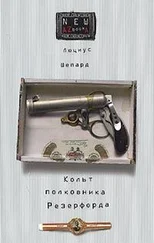Mingolla said that he felt better, too.
They sat without speaking. It wasn’t the most secure way to pass the night, but Mingolla no longer put any store in the concept of security. He was too weary to be afraid. Jay seemed entranced, staring at a point above Mingolla’s head, but Mingolla made no move for the gun. He was content to sit and wait and let fate take its course. His thoughts uncoiled with vegetable sluggishness.
They must have been sitting a couple of hours when Mingolla heard the whisper of helicopters and noticed that the mist had thinned, that the darkness at the end of the tunnel had gone gray. “Hey,” he said to Jay. “I think we’re okay now.” Jay offered no reply, and Mingolla saw that his eyes were angled upward and to the left just like the Cuban’s eyes, glazed over with ruby reflection. Tentatively, he reached out and touched the gun. Jay’s hand flopped to the floor, but his fingers remained clenched around the butt. Mingolla recoiled, disbelieving. It couldn’t be! Again he reached out, feeling for a pulse. Jay’s wrist was cool, still, and his lips had a bluish cast. Mingolla had a flutter of hysteria, thinking that Jay had gotten it wrong about being attuned: instead of Eligio becoming part of his life, he had become part of Eligio’s death. There was a tightness in Mingolla’s chest, and he thought he was going to cry. He would have welcomed tears, and when they failed to materialize he grew both annoyed at himself and defensive. Why should he cry? The guy had meant nothing to him… though the fact that he could be so devoid of compassion was reason enough for tears. Still, if you were going to cry over something as commonplace as a single guy dying, you’d be crying every minute of the day, and what was the future in that? He glanced at Jay. At the Cuban. Despite the smoothness of Jay’s skin, the Cuban’s bushy beard, Mingolla could have sworn they were starting to resemble each other the way old married couples did. And, yep, all four eyes were fixed on exactly the same point of forever. It was either a hell of a coincidence or else Jay’s craziness had been of such magnitude that he had willed himself to die in this fashion just to lend credence to his theory of half-lives. And maybe he was still alive. Half alive. Maybe he and Mingolla were now attuned, and if that were true, maybe… Revolted by the prospect of joining Jay and the Cuban in their deathwatch, Mingolla scrambled to his feet and ran into the tunnel. He might have kept running, but on coming out into the dawn light he was brought up short by the view from the tunnel entrance.
At his back, the green dome of the hill swelled high, its sides brocaded with shrubs and vines, an infinity of pattern as eyecatching as the intricately carved facade of a Hindu temple; atop it, one of the gun emplacements had taken a hit: splinters of charred metal curved up like peels of black rind. Before him lay the moat of red dirt with its hedgerows of razor wire, and beyond that loomed the blackish-green snarl of the jungle. Caught on the wire were hundreds of baggy shapes wearing bloodstained fatigues; frays of smoke twisted up from the fresh craters beside them. Overhead, half-hidden by the lifting gray mist, three Sikorskys were hovering. Their pilots were invisible behind layers of mist and reflection, and the choppers themselves looked like enormous carrion flies with bulging eyes and whirling wings. Like devils. Like gods. They seemed to be whispering to one another in anticipation of the feast they were soon to share.
The scene was horrid yet it had the purity of a stanza from a ballad come to life, a ballad composed about tragic events in some border hell. You could never paint it, or if you could the canvas would have to be as large as the scene itself, and you would have to incorporate the slow boil of the mist, the whirling of the chopper blades, the drifting smoke. No detail could be omitted. It was the perfect illustration of the war, of its secret magical splendor, and Mingolla, too, was an element of the design, the figure of the artist painted in for a joke or to lend scale and perspective to its vastness, its importance. He knew that he should report to his station, but he couldn’t turn away from this glimpse into the heart of the war. He sat down on the hillside, cradling his sick hand in his lap, and watched as—with the ponderous aplomb of idols floating to earth, fighting the cross-draft, the wind of their descent whipping up furies of red dust—the Sikorskys made skillful landings among the dead.
Halfway through the telling of his story, Mingolla had realized that he was not really trying to offend or shock Debora, but rather was unburdening himself; and he further realized that by telling it he had to an extent cut loose from the past, weakened its hold on him. For the first time he felt able to give serious consideration to the idea of desertion. He did not rush to it, embrace it, but he did acknowledge its logic and understand the terrible illogic of returning to more assaults, more death, without any magic to protect him. He made a pact with himself: he would pretend to go along as if desertion were his intent and see what signs were offered.
When he had finished, Debora asked whether or not he was over his anger. He was pleased that she hadn’t tried to offer sympathy. “I’m sorry,” he said. “I wasn’t really angry at you… at least that was only part of it.”
“It’s all right.” She pushed back the dark mass of her hair so that it fell to one side and looked down at the grass beside her knees. With her head inclined, eyes half-lidded, the graceful line of her neck and chin like a character in some exotic script, she seemed a good sign herself. “I don’t know what to talk to you about,” she said. “The things I feel I have to tell you make you mad, and I can’t muster any small-talk.”
“I don’t want to be pushed,” he said. “But believe me, I’m thinking about what you’ve told me.”
“I won’t push. But I still don’t know what to talk about.” She plucked a grass blade, chewed on the tip. He watched her lips purse, wondered how she’d taste. Mouth sweet in the way of a jar that had once held spices. She tossed the grass blade aside. “I know,” she said brightly. “Would you like to see where I live?”
“I’d just as soon not go back to ‘Frisco yet.” Where you live, he thought; I want to touch where you live.
“It’s not in town,” she said. “It’s a village downriver.”
“Sounds good.” He came to his feet, took her arm and helped her up. For an instant they were close together, her breasts grazing his shirt. Her heat coursed around him, and he thought if anyone were to see them, they would see two figures wavering as in a mirage. He had an urge to tell her he loved her. Though most of what he felt was for the salvation she might provide, part of his feelings seemed real and that puzzled him, because all she had been to him was a few hours out of the war, dinner in a cheap restaurant and a walk along the river. There was no basis for consequential emotion. Before he could say anything, do anything, she turned and picked up her basket.
“It’s not far,” she said, walking away. Her blue skirt swayed like a rung bell.
They followed a track of brown clay overgrown by ferns, overspread by saplings with pale translucent leaves, and soon came to a grouping of thatched huts at the mouth of a stream that flowed into the river. Naked children were wading in the stream, laughing and splashing each other. Their skins were the color of amber, and their eyes were as wet-looking and purplish-dark as plums. Palms and acacias loomed above the huts, which were constructed of sapling trunks lashed together by nylon cord; their thatch had been trimmed to resemble bowl-cut hair. Flies crawled over strips of meat hung on a clothesline stretched between two of the huts. Fish heads and chicken droppings littered the ocher ground. But Mingolla scarcely noticed these signs of poverty, seeing instead a sign of the peace that might await him in Panama. And another sign was soon forthcoming. Debora bought a bottle of rum at a tiny store, then led him to the hut nearest the mouth of the stream and introduced him to a lean, white-haired old man who was sitting on a bench outside it. Tio Moises. After three drinks Tio Moises began to tell stories.
Читать дальше






